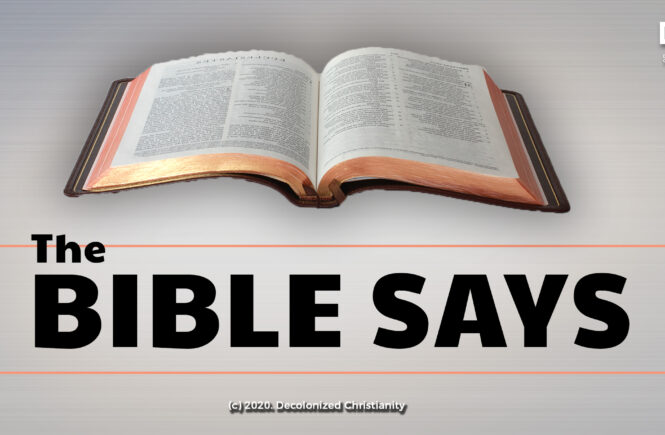In many Church environments, some people truly believe that invoking “the Bible says” carries additional alethic weight. The apparent logic seems to derive from a common view of the bible as being purely divine and infallible. In this piece, I shall not be concerned much about the meaning of infallibility or the numerous nuanced articulations of the doctrine. Instead, I will only focus on some related practical matters influencing interpersonal relations.
Too often, I have observed the invocation of “the Bible says” used to abruptly end conversations, even if no clarification is offered; it has also been used to push a speaker’s agenda. I have been on the receiving end of both. Undoubtedly, I surely must have also been a giver. In the Nigerian setting that is my main focus, it typically would be the older person or one perceived to have more “spiritual” or church-endowed authority that would do the invocation. The mutually understood “law” of engagement is that the lesser ought to accept what the older person would soon say right after the formulaic invocation. This is supposed to be the right attitude of a spiritual Christian who recognizes the authority of the church. But this arrangement is mostly not helpful. For instance, is it really the authority of Scripture that would be challenged if the lesser person pushed back a bit or the authority (and accuracy) of the speaker? I am convinced that this order of engagement does not pay sufficient attention to this issue.
Whatever one’s views of the bible may be, I hope that we can agree, at the least, that it is a work of literature. As a work of literature, people may sometimes read portions of it differently than the authors intended. Particularly, it seems obvious to me that whenever anyone – whether that be a general overseer who has served God longer than Methuselah lived or a newcomer to Jesus – utters, “the bible says,” the pronouncement that would soon follow is a mere announcement of the speaker’s understanding of what is written. If this is the case, then that voiced understanding may be correct; it may also be quite wrong. In other words, invoking, “the bible says,” does not necessarily make the accompanying statement correct.
It may have escaped our notice, but no version of the Bible speaks. People speak for the Bible. And in so doing, unfortunately, they must speak with their biases. None of us is yet able to shed her biases. Biases are inherent to humanity. We can work very hard to increasingly recognize our biases, but shedding them completely is an impossible task under the present order of things. And, no, it does not matter how much of the Holy Ghost or Spirit one has.
Here is a related matter. I have also heard well-meaning Christians say something like, “the Word of God cannot be understood with human reasoning or logic.” (This usually happens when one defends or proposes a contrary view to the interlocutors’.) This is surely an untruth. I’m yet to see anyone read the Bible without her brain. And if she uses her brain, well, the same is necessarily using human reasoning. Certainly, God can providentially help the reader reason correctly so as to obtain a sound conclusion. But he will not dismiss human intellect altogether. Rather than do that, God may as well kúkú do things by himself for this would effectively be the result of bypassing human reasoning. How is one supposed to understand God’s instructions without one’s mind?
No, human reasoning and logic are not perfect, and they must be helped to grasp spiritual truths. But this fact does not make human reasoning useless. In fact, God expects humans to use them. Why else would God inspire people to write intelligible things? Know he not that our minds will get in the way? Surely, there are infinite ways that God could ensure that we don’t use our minds in spiritual matters. For instance, he could have angels write in their (abstruse) language(s) and give the results to his human prophets. In that case, both the prophets and the rest of us will be utterly clueless as to what the message is; of course, a fair question would remain, “why involve the poor prophets at all?”
To be clear, I believe that there is a correct reading of Scripture. Bible books authors had definite goals, truths, and messages they wanted to convey, and the extent to which we apprehend those truths is the extent to which we would have correctly understood them. However, the correct reading isn’t always the popular one. In some cases, a correct reading may be impossible to ascertain due to textual ambiguities. Indeed, historically, this textual matter partly informed the multiplicity of denominations today. These denominations were formed typically because of different readings of portions of Scripture. In other words, we have centuries of history to teach us that we will not always agree on everything.
I recently gained knowledge of a very, very, very beautiful thing. I know of a Church where every sermon to be preached on Sunday is first discoursed on Tuesday among the Church’s select bible teachers consisting of women, men, blacks, and whites in roughly equal numbers and different age groups. (I’m confident that more diversity will be reflected as that church becomes more diverse.) You only have to listen to ONE sermon to realize the genius that this is. The fact is that the most anointed amongst us is still quite human. (Remember David? How about the foremost Apostle Peter?) There are things a woman, for example, will more readily see in Scripture that the typical man will miss a million times over. For instance, how many men even noticed that the encounters of Abram with Hagar and David with Bathsheba probably constituted rape? Similarly, a black person will see things that centuries of privileged socialization will not allow a white reader to see — for instance, the substantial roles of black and brown people in the Bible. Bringing diversity to bear on our exegetical exercises will increase the likelihood of approximating the original message of a passage. Is there not safety in a multitude of advisers?
But, of course, our current churching system in Nigeria would not bend easily to the idea of a plurality of contributors to sermons since the lead preacher would rather continue to act the role of a Moses who alone is distinguished and privileged to hear from God. This is why I am convinced that this churching system is largely responsible for the nation’s underdevelopment — a story I have told elsewhere on this blog.
Let’s stop demonizing logic and human reasoning. These are not the problems. The problem is our proclivity to enthrone intellectual laziness. We have cleanly severed the spiritual from intellectual issues in a manner not reflective of daily reality. This will only set up parishioners for cognitive dissonance and make them function sub-optimally in life, even if it makes them easier to be (excessively?) influenced by church leadership.
Of course, not all of us can study Hebrew, Aramaic, Ugaritic, or Greek. But we sure can all train ourselves to (at least, desire to) evaluate claims without idolizing our current understanding, often garbed as hooded personal “revelations,” in the face of often simple contrary ideas.




